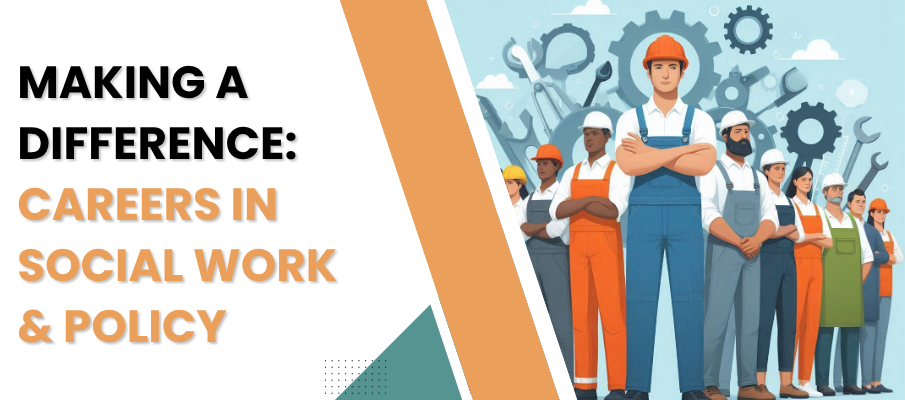
Have you ever felt the urge to do something meaningful with your life—something that goes beyond your success and makes a difference in the lives of others? That’s where the idea of social impact comes in.
But let’s start at the beginning. What is social impact?
At its core, social impact refers to the effect of an activity or initiative on the well-being of people and communities. It’s not just about charity or volunteering on weekends. It’s about creating real, measurable, and long-term change in society—whether that’s by improving education, fighting climate change, empowering women, supporting mental health, or helping rural communities thrive.
Where Does Social Impact Happen? Everywhere.
One common myth is that social impact work only happens in NGOs or remote villages. This is not true. While NGOs are at the forefront of grassroots change today, the landscape has expanded dramatically.
Social enterprises, corporate CSR teams, government initiatives, tech startups with a heart, and educational programs—these are all part of the social impact ecosystem. Whether it’s a clean energy startup in Bengaluru, a mental health helpline in Mumbai, or a rural education initiative in Bihar, social impact is being made everywhere in India.
Take, for example, the Tata Trusts, one of the oldest philanthropic foundations in the country. They work on everything from water conservation to child nutrition. Or consider Selco India, a social enterprise that brings solar energy to underserved communities. These aren’t just “do-good” projects—they’re long-term solutions that touch thousands of lives.
Why Is It Gaining Popularity in India?
India is a land of contrasts. While we have world-class tech talent and unicorn startups, millions of people lack access to clean drinking water, quality education, or proper healthcare. This imbalance has made many young Indians stop and think, “What am I doing to change this?”
With the rise of social media and a more connected world, people—especially millennials and Gen Z—are more aware than ever. They don’t just want to earn; they want to contribute. They want careers with purpose. This shift in mindset has made the social impact space a hub of opportunity and innovation.
What Kind of Jobs Exist in Social Impact?
Many people don’t realize that social impact is not just for social workers or activists. It’s for strategists, writers, engineers, designers, teachers, lawyers, data analysts—literally everyone.
Here are a few job roles you might find:
- Program Manager in an NGO working on child welfare
- CSR Consultant helping companies plan their social investments
- Fundraising Officer who helps bring in the money for important causes
- Impact Analyst measuring the effectiveness of social programs
- Content Creator sharing stories from the ground to raise awareness
- Tech for Good Developer building tools or apps that support social initiatives
- Rural Development Fellow living and working in a village to build sustainable change
| Careers | Eligibility |
|---|---|
| Government managers - health and social policy development and program administration | Bachelor's Degree |
| Managers in social, community and correctional services | Bachelor's Degree |
| Other professional occupations in social science, n.e.c. | Bachelor's Degree |
| Probation and parole officers and related occupations | Bachelor's Degree |
| Social and community service workers | Bachelor's Degree |
| Social policy researchers, consultants and program officers | Bachelor's Degree |
| Social workers | Bachelor's Degree |
Where Can You Start?
Starting your journey in social impact doesn’t mean you have to quit your job or move to a village tomorrow. You can begin small—volunteer on weekends, join an initiative in your city, donate your skills, or read more and spread awareness.
But if you’re serious and want to dive in, here are a few platforms and programs in India to explore:
- India Fellow Program – A full-time experiential social leadership program
- Young India Fellowship (Ashoka University) – A year-long course combining liberal arts and leadership
- SBI Youth for India – A rural fellowship supported by the State Bank of India
- Azim Premji University – Offers programs in development, public policy, and education
- YourStory Social Impact Section – Follow it to learn about real Indian changemakers
You can also check out job platforms like DevNetJobs India, iVolunteer, and YKA Opportunities for openings in the social space.
Why Should You Care?
Let’s be honest—making a social impact isn’t always glamorous. It takes patience, empathy, and a deep desire to continue despite slow results. But ask anyone who’s been in the field for a while, and they’ll tell you—it’s worth it.
There’s something deeply fulfilling about seeing a child go to school for the first time because of your initiative. Or helping a farmer learn new techniques to double his yield. Or creating an app that helps women in remote areas connect to health services.
You’re not just earning a living. You’re making a life worth living.
Final Thoughts: We Need More Doers
India doesn’t just need dreamers—it needs doers. If you’ve ever felt frustrated about the problems around you—corruption, inequality, poverty—maybe that’s your inner changemaker calling.
You don’t have to wait for permission. You have to start.
The world doesn’t change overnight. But change starts when ordinary people decide they’ve had enough and choose to act. Social impact is about those people—and you can be one of them.



